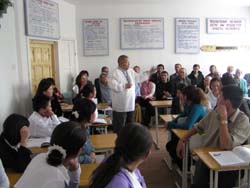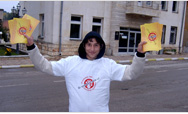You are here » Home » Telling Our Story
Success Story
Students challenge the
status quo
Seeing Civic Education in Action

| |
Photo: FES
|
|
Civic education students listen to a
visiting mullah.
One student said that
USAID’s civic education
course “is, for us, the
‘thinking’ class. We read, we
debate, and read again. These
books are very interesting
with lots of new ideas all
related to our lives.”
|
Following the collapse of the Soviet Union, the newly independent Central Asian Republics faced the challenge of building nation states and the need for establishing democratic institutions and market economies. These were very new ideas for the region, and the historical legacy of systems, processes and social attitudes posed serious obstacles to change. To build a solid foundation for democratic development, citizens must learn their rights and responsibilities.
In Kyrgyzstan, USAID is supporting a civic education program to encourage students to think critically about good governance, democracy and civic activism. The program focuses on exposing young citizens to the basic features of a democracy: formulating their own opinions, learning about the structure and responsibilities of their government and actively participating in their country’s development. Originally introduced in 669 schools, the civic education program is in the process of being extended to all of Kyrgyzstan’s 2,020 schools.
USAID worked to significantly improve the program’s textbooks in 2004 to include interactive exercises, updated information and teaching examples. USAID also supported extracurricular activities, including student local government days, student action committee meetings and democracy summer camps, which gave 700 students hands-on experience in democratic procedures.
Students in Karakul were visited recently by a group of local religious leaders, or mullahs, who had come to see the civic education course in practice. The mullahs said they were surprised and pleased by what they found: frank discussions about religion, tradition and the Quran. Clearly, the early investments in civic education have already had an impact, and will continue to as Kyrgyzstan continues its journey toward a more democratic future.
Print-friendly version of this page (244kb - PDF)
Click here for high-res photo
Back to Top ^ | 

